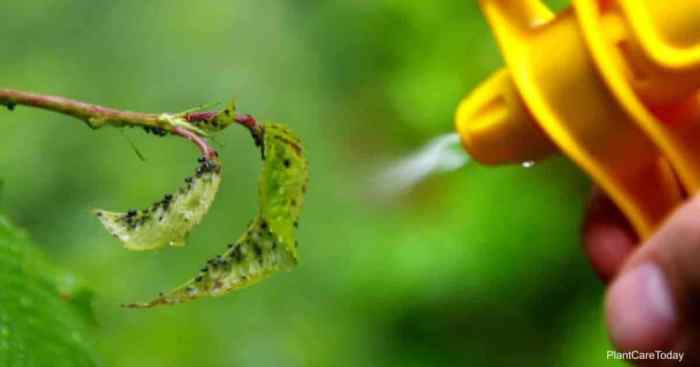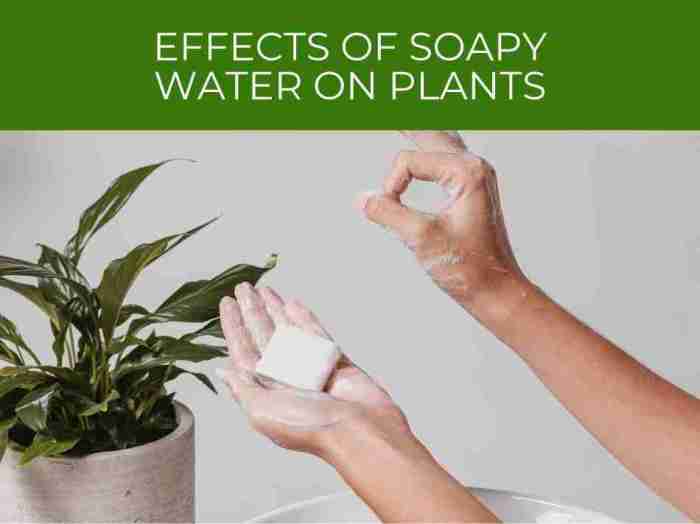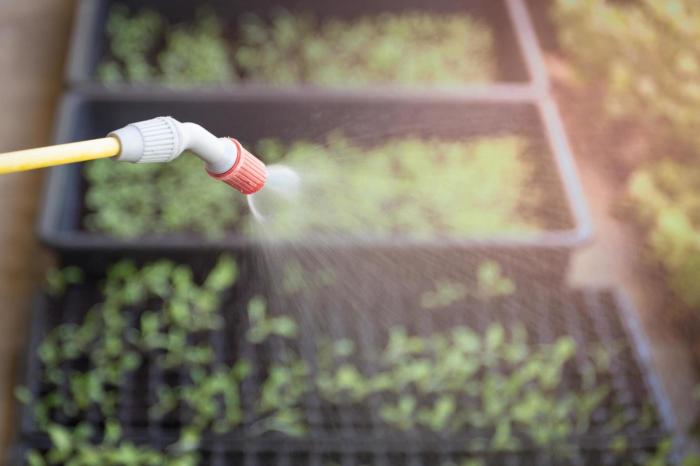Can You Spray Plants With Soapy Water?
Soapy Water Solutions for Plant Pest Control

Source: plantcaretoday.com
Can you spray plants with soapy water – Using soapy water as a natural pest control method offers a relatively safe and readily available alternative to chemical insecticides. However, understanding the different types of soap, application techniques, and potential risks is crucial for successful and safe application. This guide provides a comprehensive overview of using soapy water for plant pest control.
Types of Soapy Water Solutions
Several types of soap can be used to create effective pest control solutions, each with its own strengths and weaknesses. The key is to use a gentle soap and dilute it properly to avoid damaging plants.
| Soap Type | Dilution Ratio | Target Pests | Benefits/Drawbacks |
|---|---|---|---|
| Dish Soap (e.g., Dawn) | 1-2 teaspoons per gallon of water | Aphids, spider mites, mealybugs (less effective against larger pests) | Readily available, inexpensive; may be less effective than insecticidal soap; potential for plant damage with overuse or incorrect dilution. |
| Insecticidal Soap | Follow product instructions (typically diluted) | Aphids, spider mites, whiteflies, mealybugs, thrips | Specifically formulated for pest control; generally more effective than dish soap; may require more frequent applications; can be more expensive. |
| Potassium Soap | Follow product instructions (typically diluted) | A wide range of soft-bodied insects | Effective against many pests; biodegradable; can be more expensive than dish soap. |
Application Methods and Techniques
Proper application is key to maximizing effectiveness and minimizing the risk of plant damage. Timing and technique play crucial roles in achieving the desired results.
The best time to spray is typically in the early morning or late evening when the sun is less intense and temperatures are cooler. This minimizes the risk of sunburning the leaves after spraying. Avoid spraying during the hottest part of the day.
- Mixing the Solution: Carefully measure the soap and water according to the chosen dilution ratio. Gently stir until the soap is completely dissolved.
- Application: Use a spray bottle with a fine mist setting for even coverage. Avoid spraying directly onto flowers, as this can damage the delicate petals. Apply the solution to all plant surfaces, including the undersides of leaves where pests often hide.
- Safety Precautions: Wear gloves and eye protection when handling and applying soapy water solutions. Avoid spraying on windy days to prevent drift.
- Small Plants: A gentle hand spray is sufficient.
- Large Plants: Use a pump sprayer or hose-end sprayer for efficient coverage.
- Hanging Plants: Spray from underneath to ensure thorough coverage.
Target Pests and Effectiveness
Soapy water is most effective against soft-bodied insects. Its effectiveness compared to other methods varies depending on the pest and the severity of the infestation.
| Pest Type | Effectiveness of Soapy Water | Alternative Control Methods |
|---|---|---|
| Aphids | High (especially insecticidal soap) | Neem oil, ladybugs |
| Spider Mites | Moderate to High | Miticides, horticultural oil |
| Mealybugs | Moderate | Isopropyl alcohol, systemic insecticides (use cautiously) |
Potential Risks and Side Effects

Source: hosepipehub.com
While generally safe, soapy water can cause damage if misused. Over-application or using too strong a solution can lead to leaf burn or other plant damage.
Signs of soap damage include yellowing or browning of leaves, leaf drop, and stunted growth. If you observe these signs, immediately rinse the plant thoroughly with clean water.
To avoid harming beneficial insects, spray only affected areas and avoid spraying during peak pollinator activity.
While spraying plants with soapy water can help control pests, it’s crucial to use a mild solution and avoid overdoing it. This brings to mind another propagation question: if you’re interested in expanding your plant collection, you might find this article helpful on whether can you propagate swiss cheese plant in water. Returning to soapy water, remember to rinse your plants thoroughly afterward to prevent residue buildup which can hinder their growth.
Plant-Specific Considerations, Can you spray plants with soapy water

Source: vecteezy.com
Some plants are more sensitive to soapy water than others. Always test a small area of the plant before spraying the entire plant.
- Sensitive Plants: Ferns, succulents, and some flowering plants may be more susceptible to damage.
- Resistant Plants: Many common vegetables and herbs tolerate soapy water solutions well.
Illustrative Examples
A plant successfully treated with soapy water will show a reduction in pest numbers, healthy green leaves with no signs of yellowing or browning, and overall vigorous growth. Pests will be visibly less prevalent.
A plant negatively affected by soapy water will exhibit yellowed or brown leaf margins or spots, leaf drop, wilting, and potentially stunted growth. The leaves might appear scorched or discolored.
FAQ Overview: Can You Spray Plants With Soapy Water
Can I use any type of soap?
No, avoid soaps containing additives like perfumes or dyes. Unscented dish soap or insecticidal soap are generally safe options.
How often can I spray my plants?
Frequency depends on the pest infestation and plant type. Start with one application and monitor for results. Avoid over-spraying.
What should I do if my plant shows signs of damage after spraying?
Rinse the plant thoroughly with clean water. Reduce the soap concentration in future applications. If damage persists, cease use.
Is soapy water effective against all pests?
No, it’s most effective against soft-bodied insects like aphids and spider mites. It may not be effective against all pests.




















